ASRock X58 Extreme3: An Enthusiast X58 Motherboard at a Budget Price?
by Ian Cutress on June 2, 2010 4:10 PM EST- Posted in
- Motherboards
- Intel
- ASRock
- X58
Basic comparisons in simple tests yield very similar figures for the ASRock board to the EX58-UD3R:
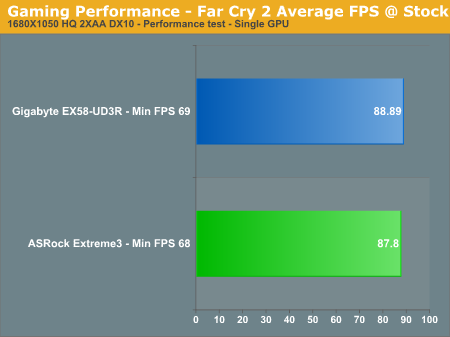
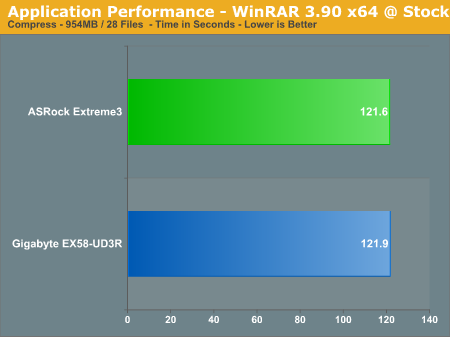
These results translate through our suite in general - the ASRock board performs similarly in 2D benchmarks, but is at a slight loss in all our 3D benchmarks.
Power Consumption
Our power consumption testing utilizes the same batch of components under similar circumstances in a bid to monitor variances between idle and CPU load conditions. We install the vendor supplied power saving utilities on each board (when available) and enable power saving modes that don't involve any kind of underclocking or CPU core frequency modulation in order to run an apples to apples comparison.
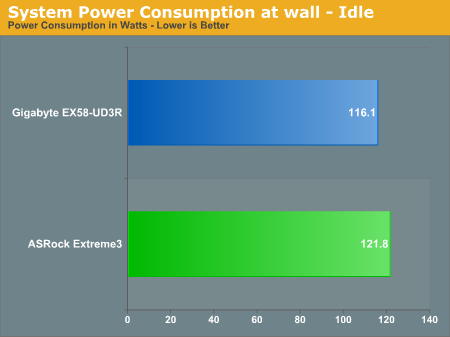
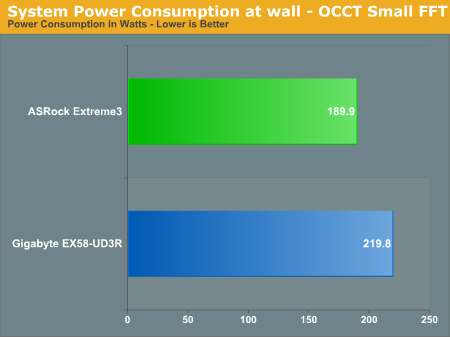
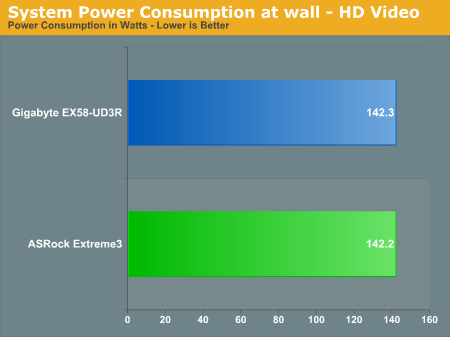
Under idle and normal loads, the ASRock board perfroms similarly to the Gigabyte. The biggest surprise here is the power usage under heavy load, where the ASRock draws approximately 30W less than the Gigabyte board - we’re not entirely sure the reasons behind such a difference are, given the HD Video power usage values are essentially equivalent. Any X58 folders may prefer the ASRock board, if the cost of 30W is extrapolated over the course of a year.
Overclocking
Alongside BIOS tools, ASRock also provides software on the bundled CD, called OC Tuner, to help manage overclocks in the Windows operating system. However, using simply the BIOS, which we prefer, we were able to provide a very decent overclock of 4.1GHz on our Core i7-920 D0:
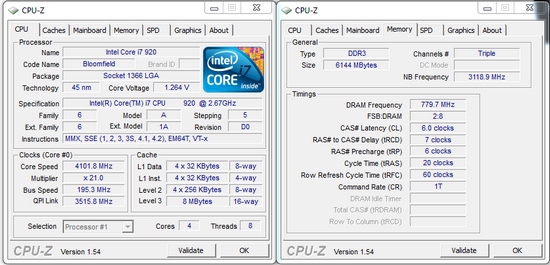
Using the Corsair H50-1 basic water cooling, on a push-pull fan arrangement, a 4.1Ghz clock speed reached a maximum of 80ºC under the Intel Burn Test (ambient 18ºC). The Intel Burn Test is overkill for temperature testing, but on an open test bench does go some way to modelling the overclock when it's in a case in the middle of summer. Under normal multi-threaded load, on the open test bench, temperatures rose to 75ºC. To achieve this setting, VCore was upped to 1.275V, IOH to 1.302V and VTT to 1.34V. With DRAM at 1.654V, all other voltages were switched from Auto to their lowest recommended setting. Left under the Auto setting, even at stock speeds, the VTT defaults to 1.48V and the CPU PLL to 1.92V, both above the lowest setting, which results in a hot-to-touch southbridge.
Overclock stability was tested with HyperPi, 300% MemTest and three hours of LINPACK, as well as the variety of benchmarks used in this review.










35 Comments
View All Comments
529th - Wednesday, June 2, 2010 - link
See, that's what I like about the Asrock Bios, very simple. The EVGA bios on the 760 classified needs to be modeled after a better bios.529th - Wednesday, June 2, 2010 - link
correction, BIOSRajinder Gill - Thursday, June 3, 2010 - link
Not sure that ASRock would be the brand for EVGA to follow. ASUS would make more sense.dingetje - Wednesday, June 2, 2010 - link
I would not call $190 a budget price. That's a FAIL title if I've ever seen one.jonup - Thursday, June 3, 2010 - link
There is only four cheaper ATX X58 MB on newegg.com. Except for the Foxconn one the others are priced between $170 and 190. The median price of X58 is arround $240 and the mean price is not much off that mark. Keep in mind that the ASrock comes with lots of bells and whistles.So for everyone complaining about the term budget in the title, it is a budget X58 board.Taft12 - Thursday, June 3, 2010 - link
As the poster above me has shown, the only FAIL here is your understanding of this market segment.dingetje - Friday, June 4, 2010 - link
oh, I understand it's as low as it goes for an X58 mobo.calling 190 bucks a budget price however is ridiculous imo.
jonup - Friday, June 4, 2010 - link
In absolute terms you are right. In relative terms it is a budget solution period. There are socket 1366 people with more expensive cooling solutions for 24/7 use than this MB. And I am not talking about the record setting freaks.LoneWolf15 - Thursday, June 3, 2010 - link
on the VRMs will get noisy and/or die within a year to a year and a half.Better to skip it as unnecessary and lower the price.
zero2dash - Thursday, June 3, 2010 - link
Why in the world would you mention the old X58-UD3R when the X58A-UD3R is available for $199-$219 depending on retailer, has USB3, SATA3, 6ram slots, a 4 PCIe slots?I bought 2 of them at Micro Center to replace the ASRock X58 Extreme that died on me after 2 months of use folding@home. First ASRock board, last ASRock board I will ever buy. One day it refused to power on for no reason. Once I got the RMA back, I sold it used because I didn't want to bother with ASRock anymore.
Now that Abit is out of the business, it's Gigabyte or nothing for me (Asus in a last ditch pinch if I had to have a board, otherwise GB beats Asus on bang for the buck). 2x X58A-UD3R and 1 EP45-UD3P all f@h 24/7, high oc's - no problems on any of them. Love GB.